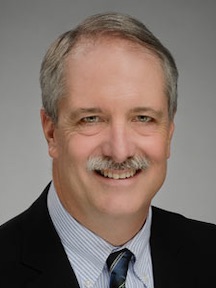By Jacob Morrow-Spitzer
While many know Phi Beta Kappa as a national organization—it has more than 500,000 members and 286 university chapters across the United States—much of the organizing done by the Society happens at a far more localized level. Each region has its own Phi Beta Kappa association that works to involve members living in its district and often partners with local university chapters. The Maine Association of Phi Beta Kappa, based in Portland and drawing local ΦBKs from across the state, is one such group. As president of the local association, Timothy P. Benoit (ΦBK, University of Vermont), a Portland-based attorney, oversees Phi Beta Kappa programming for alumni members in the state and works with Maine’s four university chapters and their resident members.
Benoit grew up in Burlington, Vermont, and chose to stay close to home for college, attending the University of Vermont where he excelled as a double major in history and political science. After graduating, he attended the University of Maine Law School in Portland and the Boston University School of Law. After three years of working as a tax lawyer, he moved to Portland and began to work at his current firm, Perkins Thompson. He manages clients from around New England and down the eastern seaboard in general business practice, tax law, estate planning, and business succession planning.
His involvement with the Maine Association of Phi Beta Kappa began in the early 2000s, when he attended a scholar lecture and dinner event put on by the group. According to Benoit, the group was founded in the 1990s by a doctor and “a wide variety of board members wanting to set up a regular schedule of events that local members could attend,” he recalled. The group worked with ΦBK’s national office to create an association, which was officially charted in 2003 under inaugural president Kathleen Gensheimer. Benoit attended a number of events in those early years and quickly got involved in the organization’s leadership. For nearly a decade now, he has been the association president.
As president, Benoit oversees the organization of the group and the execution of one or two programs per year. At each event, the association invites a speaker of interest to give a lecture—a person, Benoit described, who can “bring different perspectives to our association members.” The diverse list of speakers has included a federal judge, an urban planner, a political scientist, and a newspaper reporter, with any given event drawing ten to twenty-five people, Benoit said. The association will often partner with one of the four Maine chapters of Phi Beta Kappa—Bowdoin, Bates, Colby, or the University of Maine—to put on speaker events. The association’s board, which includes Benoit and six other local Phi Beta Kappa members, also organizes a state-wide scholarship event for high school students. Each year, outstanding high school juniors from 120 schools across Maine receive the Phi Beta Kappa Association of Maine Academic Achievement Award to recognize those showing promise in the liberal arts and sciences.
A challenge the group faces, however, is involving young Phi Beta Kappa members in the local association. For a number of reasons—including a small social media presence and “.edu” email addresses that many members stop checking after leaving college—gathering support from people in their 20s, 30s, and even 40s can be a difficult task for an association in a small state like Maine. Unlike in bigger cities such as Washington, D.C., and New York, which have impressive social media presences and numerous local association events, Portland does not yet drum up the same level of involvement. While Benoit predicts that there are roughly 3,500 Phi Beta Kappa members in Maine, only 50 to 100 are ever active dues-paying members of the Maine Association. Despite the “ebbs and flows” of popularity and member turnout, the group has remained cohesive and active to this day.
The Maine Association is taking steps to increase its local involvement, particularly among younger Phi Beta Kappa members. The association is working toward building a LinkedIn page and a social media presence, all while keeping its member lists updated with correct email addresses. Looking ahead, Benoit said he would like to get more scientists and medical people involved with local programming (because of his career in the legal field, he explained, lawyers currently make up a disproportionate percentage of the Maine Association). And while “the world is heading toward more specialization,” Benoit observed, “we need to continue to balance the liberal arts” with professional science and medial fields.
To Benoit, the purpose of Phi Beta Kappa is to “challenge society to get people out of their comfort zones” and to cross disciplinary boundaries. “We should be encouraging physics majors to take a history course, and history majors to take a physics class,” he remarked. “I value being a member of Phi Beta Kappa, and as a liberal arts graduate I appreciate the perspective that that brought and the education it gave me.” And, as an established lawyer at a firm in the state of Maine’s biggest city, Benoit said that seeing “Phi Beta Kappa” on someone’s resume is an indication to him that they’re a hard worker and will likely be as successful in the office as they were in the classroom. Better yet—they might just be the next member of the growing Maine Association.
To get involved in the Maine Association and to see upcoming events, visit https://www.mainepbkassociation.org/.
Jacob Morrow-Spitzer is a recent graduate of Tulane University, where he majored in History and Jewish Studies and minored in Mathematics. He was inducted into the Alpha of Louisiana chapter of Phi Beta Kappa in May of 2018. He will begin his Ph.D. in History in the fall.




